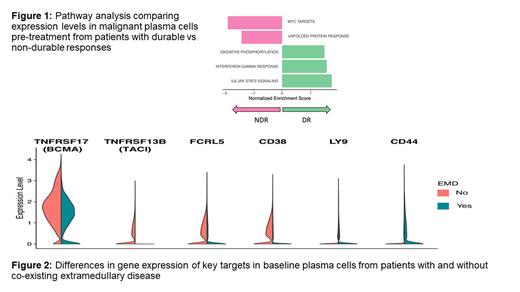Introduction
Single cell sequencing confers a unique opportunity to study the complex interplay between the malignant plasma cells (PCs) and the host tumor microenvironment (TME) within the bone marrow niche. Pre-treatment factors associated with the achievement of durable responses from anti-B-cell maturation antigen (BCMA) directed CART cell therapy remain poorly understood. Herein, we performed a longitudinal single cell analysis to identify factors associated with response, or therapeutic failure, to FDA approved BCMA-directed CART cell therapy.
Methods
We performed single-cell RNA sequencing (scRNA-seq) to comprehensively characterize both the cellular and molecular properties of malignant plasma cells and TME. Separated CD138+ and CD138- components were universally encapsulated within hours of pre-CART baseline (BL) and day 90 post treatment with commercial CAR-T using 10x Genomics. Libraries were sequenced separately on an Illumina NovaSeq 6000 instrument. Cell Ranger pipelines with default parameters were used to trim reads, align, count unique molecular identifiers, and call cells. Downstream processing was carried out using Seurat. Batch effects were corrected using canonical correlation analysis (CCA) integration. After quality control for feature counts and mitochondrial gene expression, there were a total of 110,923 single cells, including 48,150 plasma cells (PC) and 62,773 TME cells. In addition, we integrated these data with an internal repository of bulk RNA sequencing (RNAseq) (N=844 CD138+ MM cells) to evaluate co-regulation of genes (Renatino-Canevarolo et al, ASH 2022). Patients were split into two broad groups, durable (DR) vs non-durable response (NDR) based on PFS cutoff of 9 months. Given its negative impact on outcomes, we also examined differences between those with or without extra-medullary disease (EMD).
Results
Median PFS for the total cohort of N=13 at the time of data cutoff was 332 days (range 279-569) for DR and 28 days (12-197) for NDR. Malignant cells were identified based on inferred copy number alterations and comparison to benign plasma cell controls from sequenced healthy donors. Single-cell expression profiles of plasma cells are primarily clustered by patient, whereas expression of non-plasma cells largely clustered by cell types. In DR, expression of BL malignant PCs revealed enriched expression of genes encoding several known surface markers, including FCRL5, CD38, TACI and BCMA, and genes associated with a more plasma-cell-like phenotype, such as XBP1, whereas EEF2 and CD48/SLAMF2 were increased in BL PCs from NDR.Pathway analysis of DR vs NDR revealed upregulated activity genes involved in the interleukin-6 pathway, interferon γ and oxidative phosphorylation (padj <0.1). In contrast, MYC pathways and unfolded protein response genes (padj < 0.1) were significantly upregulated in NDR ( Figure 1). Analysis of the BL TME illustrated fewer CD4 naïve, CD4 effector memory (EM), T effector memory RA-positive (TEMRA) cells and higher CD8 central memory (CM) cells in NDR vs DR patients. Exhaustion signatures were higher among BL CD4 and CD8 cells pre-CART in NDR relative to DR, and in D90 samples this was also more pronounced among CD4 cells in NDR vs DR samples. Comparing D90 to BL, DR patients had fewer Tregs, increased numbers of trafficking monocytes and more proliferating CD8 T-cells. Finally, looking at patients with EMD, differences in surface target gene expression were noted with decreased expression of BCMA, TACI, FCRL5, and CD38 observed, although CD44 and Ly9 expression appeared equivalent or enriched in those with known EMD (Figure 2). Interrogation of bulk RNAseq revealed that several of these genes, including BCMA, PRDM1/Blimp-1, XBP1, CD138 are co-regulated in a common geneset. This geneset was significantly downregulated in patients with NDR vs DR.
Conclusion
These data highlight the pre-treatment features of both tumor and T-cell that can pre-dispose real-world patients with RRMM to early relapse after anti-BCMA CAR-T, notably pre-existing T-cell exhaustion, and the presence of highly proliferative plasma cells with underlying resistance mechanisms, including downregulation of several known immunotherapy targets, especially in those with co-existing EMD.
Ciara L Freeman, Xiaohong Zhao & Mark B Meads contributed equally
Disclosures
Freeman:Bristol Myers Squibb: Consultancy, Honoraria, Research Funding; Celgene: Consultancy, Honoraria; ONK Therapeutics: Consultancy, Honoraria; Janssen: Consultancy, Honoraria, Research Funding. Hampton:Aster Insights: Current Employment. Baz:ASH: Honoraria; AHOMPR: Honoraria; Curio Science: Honoraria; HIKMA Cancer Network: Honoraria; Regeneron: Research Funding; GSK: Honoraria; Pfizer: Membership on an entity's Board of Directors or advisory committees, Research Funding; Karyopharm: Research Funding; Janssen: Membership on an entity's Board of Directors or advisory committees, Research Funding; AbbVie: Research Funding; BMS: Membership on an entity's Board of Directors or advisory committees, Research Funding. Alsina:Genzyme: Consultancy, Honoraria; Bristol Myers Squibb: Consultancy, Research Funding; RevHealth LLC, Red Med LLC: Honoraria; Janssen Oncology: Consultancy, Speakers Bureau. Hansen:Survivorship: Honoraria; Pfizer: Consultancy; MM Pfizer Advisory Board: Membership on an entity's Board of Directors or advisory committees; BMS MM ASH Steering Committee: Membership on an entity's Board of Directors or advisory committees; BMS IMW Ide-Cel Academic Advisory Board: Membership on an entity's Board of Directors or advisory committees; Pentecost Family Myeloma Research Center: Research Funding; Onc Live: Honoraria; International Myeloma Society Young Investigator Award: Research Funding; Karyopharm: Consultancy, Research Funding; Janssen: Consultancy; BMS: Consultancy, Research Funding. Shain:BMS: Consultancy, Honoraria, Speakers Bureau; Amgen: Honoraria, Speakers Bureau; Janssen: Consultancy, Honoraria, Research Funding, Speakers Bureau; Karyopharm: Honoraria, Research Funding; Sanofi Genzyme: Honoraria, Speakers Bureau; Adaptive: Consultancy, Speakers Bureau; Abbvie: Research Funding; GSK: Honoraria, Speakers Bureau.


This feature is available to Subscribers Only
Sign In or Create an Account Close Modal